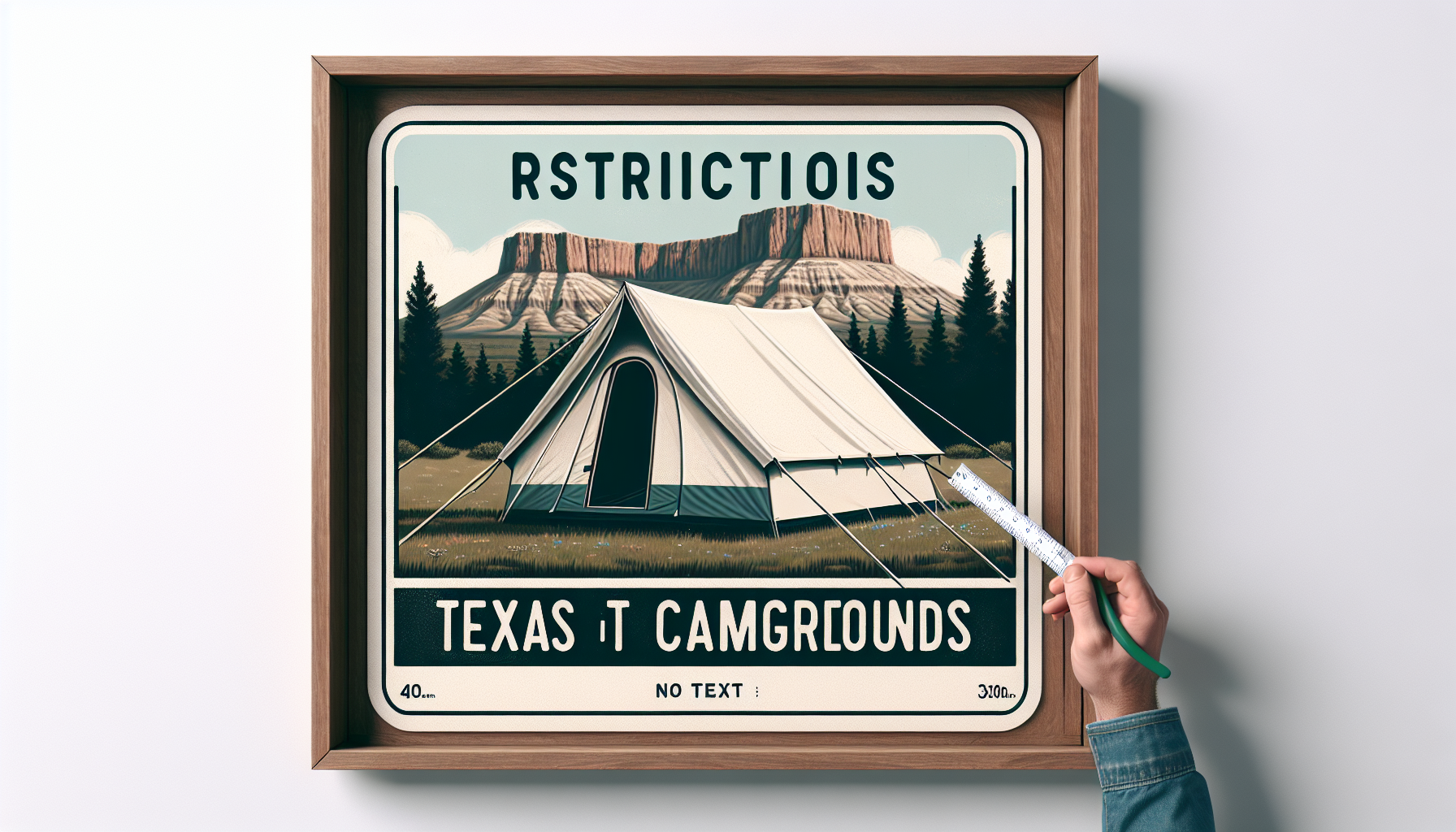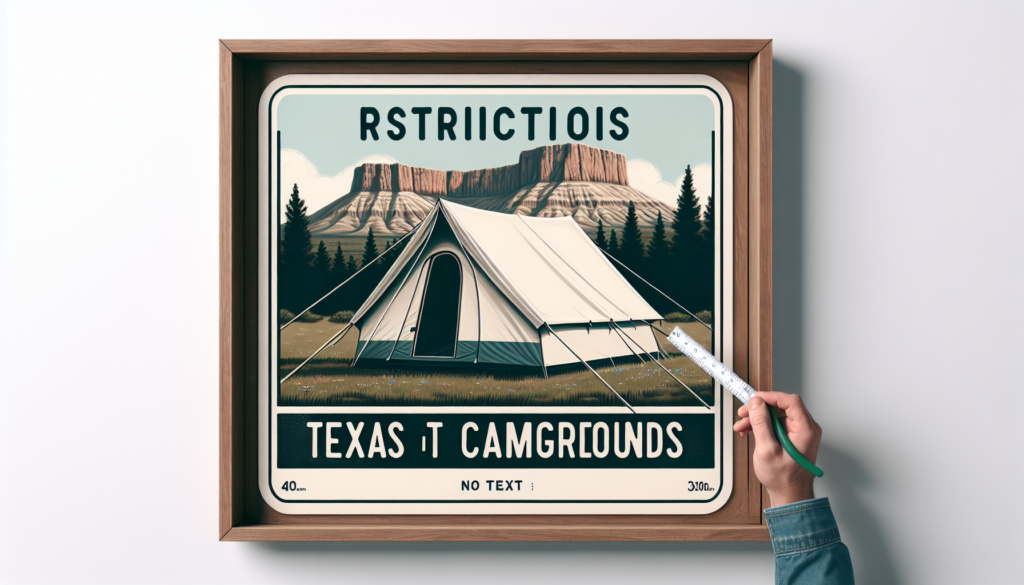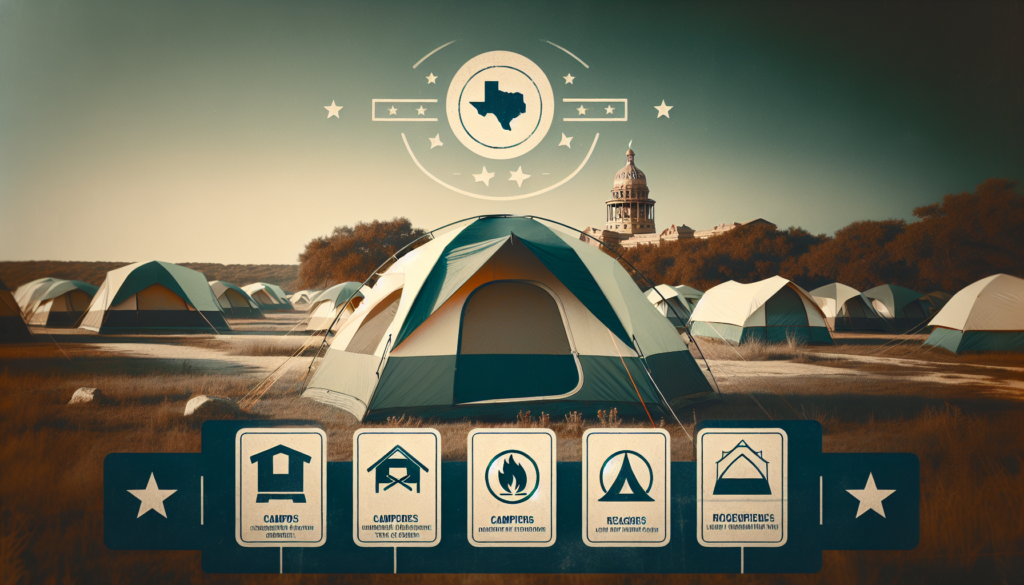
Texas campgrounds offer a breath of fresh air and an opportunity to reconnect with nature. As passionate outdoor enthusiasts, we understand the thrill of setting up camp and spending the night amidst the beauty of the Lone Star State. However, before embarking on your camping adventure, it’s essential to know if there are any restrictions on tent size that you need to adhere to in Texas campgrounds. In this article, we will explore the regulations surrounding tent dimensions in these scenic camping spots, ensuring you have all the information at your fingertips for a remarkable camping experience.
Overview
When it comes to planning a camping trip in Texas, there are a few important factors to consider. One aspect that may not initially come to mind is the size of the tent you plan to use. It’s essential to be aware of any regulations regarding tent size before embarking on your outdoor adventure. In this article, we will examine the definition of tent size, the importance of knowing campground regulations, and the purpose of these restrictions.
Definition of Tent Size
Tent size refers to the dimensions of the tent, including its length, width, and height. It is important to understand the specific measurements of your tent, as many campgrounds have limitations on the allowable size. These restrictions are put in place to ensure the safety and enjoyment of all campers, as well as to protect the environment.
Importance of Knowing Campground Regulations
Knowing the regulations regarding tent size is crucial for a successful camping trip. Understanding the limitations set by the campground allows you to choose an appropriate tent that fits within those guidelines. Failure to comply with these regulations may result in penalties or even being denied entry to the campground. By educating ourselves on the rules, we can ensure a smooth and enjoyable camping experience for everyone involved.

Purpose of Restrictions
The limitations on tent size serve several purposes. Firstly, they help protect the natural environment by preventing overcrowding and minimizing the impact on local ecosystems. By restricting the size of tents, campgrounds can control the number of campers in a given area, which reduces the strain on wildlife and vegetation. Additionally, these restrictions help maintain the aesthetic appeal of the campground, ensuring that the natural beauty and serenity are preserved.
Texas Campground Regulations
The Texas Parks and Wildlife Department (TPWD) is responsible for managing Texas campgrounds and ensuring compliance with regulations. TPWD has established specific guidelines for tent size in their campgrounds, taking into account various factors such as environmental considerations, infrastructure limitations, and safety concerns. It’s important to familiarize ourselves with these regulations before selecting a campground.
Specific Regulations for Tent Size
In Texas campgrounds, specific regulations for tent size may vary depending on the individual park. Some campgrounds may have a maximum allowable tent size, while others may only permit tents of certain dimensions. It is vital to check the guidelines provided by TPWD or the specific campground to determine the exact tent size restrictions before making a reservation.
Designated Tent-Only Sites
Many Texas campgrounds offer designated tent-only sites, which are specifically designated for tent camping. These sites are often equipped with tent pads or platforms that are designed to accommodate tents of certain sizes. Choosing a designated tent-only site ensures that you are within the specified tent size limits and allows for a more enjoyable camping experience.
Factors Influencing Tent Size Restrictions
Several factors influence the restrictions on tent size in Texas campgrounds. These considerations are in place to protect the environment, ensure the safety of campers, and maintain the overall infrastructure of the campground.
Environmental Considerations
One of the primary reasons for tent size restrictions is to protect the natural environment surrounding the campgrounds. Overcrowding can lead to the degradation of vegetation, soil erosion, and the disturbance of wildlife habitats. By limiting the size of tents, campgrounds can control the number of campers and mitigate these environmental impacts.
Infrastructure Limitations
Campgrounds have limited resources and infrastructure that must be taken into account when determining tent size restrictions. The availability of amenities such as water and restroom facilities, as well as the capacity of parking areas, can impact the maximum allowable tent size. By setting restrictions, campgrounds can ensure that their resources are not overwhelmed and can be adequately shared among all campers.
Safety and Emergency Response Concerns
Another critical factor influencing tent size restrictions is the safety of campers and the ability to respond to emergencies. In the event of severe weather, it is essential to have enough space for campers to find shelter and for emergency personnel to access the campground if needed. By limiting tent sizes, campgrounds can prevent overcrowding and facilitate a safe and efficient response in case of an emergency.

Types of Campgrounds
In Texas, there are several types of campgrounds to choose from, each with its own regulations and guidelines. Understanding the differences between public campgrounds, private campgrounds, and backcountry camping can help determine the specific limitations on tent size.
Public Campgrounds
Public campgrounds, often operated by state or federal agencies, offer a range of amenities and services for campers. These campgrounds are subject to regulations set by the governing body and usually have established guidelines regarding tent size. Public campgrounds are a popular choice for many campers due to their accessibility and well-maintained facilities.
Private Campgrounds
Private campgrounds, on the other hand, are independently owned and operated. While they may still have regulations in place, private campgrounds tend to have more flexibility when it comes to tent size restrictions. It is important to check with the specific private campground you plan to visit for their guidelines and any limitations on tent size.
Backcountry Camping
For those who prefer a more rustic and remote camping experience, backcountry camping is an option. Backcountry camping typically involves hiking to a remote location and setting up camp in the wilderness. In these areas, tent size restrictions may be less strict or nonexistent, but it’s essential to follow Leave No Trace principles and minimize our impact on the environment.
Reservation and Permitting Process
To ensure a smooth camping experience, it is essential to be aware of the reservation and permit requirements for Texas campgrounds. Understanding the process and any associated fees can help plan your trip effectively.
Pre-Booking and Availability
Before heading out to a Texas campground, it is recommended to make a reservation in advance. Campgrounds often have limited availability, especially during peak season, so it’s important to secure your spot early. Check the campground’s website or contact the campground office to inquire about availability and to make a reservation.
Permit Requirements and Fees
In addition to reservations, certain campgrounds in Texas may require permits. These permits may have associated fees, which help support the maintenance and conservation efforts of the campground. It’s important to check the specific campground’s requirements and fees before arriving to ensure compliance and a hassle-free experience.
Penalties for Non-Compliance
Failure to comply with campground regulations, including tent size restrictions, may result in penalties. These penalties can range from fines to being asked to leave the campground. To avoid any issues, it is crucial to familiarize ourselves with the regulations and adhere to them during our camping trip.
Tips for Choosing the Right Tent Size
Choosing the right tent size is essential for a comfortable camping experience. Consider the following tips when selecting a tent for your trip:
Consider the Number of Occupants
First and foremost, consider the number of occupants who will be staying in the tent. Ensure that the tent has enough space to comfortably sleep everyone and store essential camping gear. It’s better to have a slightly larger tent to accommodate additional occupants than to feel cramped and uncomfortable during your trip.
Evaluate Storage and Living Space Needs
In addition to sleeping space, evaluate your storage and living space needs. If you plan to spend a significant amount of time in the tent during inclement weather or for activities such as playing board games, having extra space can greatly enhance your comfort. Consider the height, width, and additional vestibule area of the tent to determine the right size for your needs.
Check Campground-Specific Guidelines
Always check the specific guidelines provided by the campground you plan to visit. These guidelines will outline the maximum allowable tent size and any other relevant information to help you choose the right tent. By following the guidelines, you can ensure a smooth and compliant camping experience.
Alternatives to Traditional Tents
If tent size restrictions pose a challenge for your camping plans, there are alternative options to consider. These alternatives not only provide unique experiences but may also have different size regulations. Some popular alternatives to traditional tents include RVs and campers, yurts and cabins, as well as hammocks and bivvies.
RV and Camper Options
Recreational vehicles (RVs) and campers provide a home-away-from-home experience while offering more space and amenities than a traditional tent. RVs and campers come in various sizes and can accommodate larger groups or families comfortably. However, it is important to check with the campground for any size restrictions or requirements for RV and camper sites.
Yurts and Cabins
Yurts and cabins are another alternative to traditional tents, offering a more permanent structure with built-in amenities such as beds, electricity, and heating/cooling systems. Yurts and cabins provide a comfortable and spacious camping experience while typically adhering to specific size limitations. Check with the campground to see if they offer yurts or cabins as an alternative to tents.
Hammocks and Bivvies
For those seeking a minimalist and adventurous camping experience, hammocks and bivvies are lightweight and compact options. These alternatives require minimal space and often have fewer size restrictions. However, it’s important to ensure that hammocks and bivvies are allowed in the campground you plan to visit, as some may have specific regulations regarding their use.
Additional Considerations
In addition to tent size restrictions, there are several other factors to consider when planning a camping trip in Texas. These considerations can greatly impact your overall experience and should not be overlooked.
Campsite Amenities and Proximity
When selecting a campground, consider the amenities available at the campsite. Some campgrounds offer picnic tables, fire pits, or access to hiking trails and water activities. Additionally, determine the proximity of the campsite to essential facilities such as restrooms and water sources to ensure convenience during your stay.
Weather and Climate Considerations
The weather and climate in Texas can vary greatly depending on the time of year and location. Be sure to check the weather forecast for your chosen campground to prepare adequately. Pack appropriate clothing, gear, and equipment to stay comfortable and safe in changing weather conditions.
Leave No Trace Principles
Lastly, it is important to follow the Leave No Trace principles when camping in Texas. These principles advocate for minimal impact on the environment and encourage responsible outdoor practices. By respecting nature and leaving our campsite as we found it, we can help preserve the beauty of Texas campgrounds for future generations to enjoy.
Frequently Asked Questions
As campers, we often have questions regarding tent size restrictions. Here are answers to some frequently asked questions:
Can I Exceed the Recommended Tent Size?
It is generally not recommended to exceed the recommended tent size set by campgrounds. These restrictions are in place for a reason, such as protecting the environment or ensuring safety. Exceeding the recommended size may result in penalties or the denial of entry to the campground. It’s always best to choose a tent that falls within the guidelines provided.
Are There Restrictions on Tent Features?
In addition to tent size, some campgrounds may have restrictions on tent features such as the use of stakes or the installation of additional structures. These restrictions aim to protect the campground infrastructure and ensure a safe and enjoyable experience for all campers. Be sure to check the guidelines for any specific restrictions on tent features.
What If I Have a Large Group or Family?
If you are camping with a large group or family, it is important to plan accordingly. Consider multiple smaller tents instead of one large tent to accommodate everyone comfortably. Check with the campground to see if they have specific guidelines or designated areas to accommodate larger groups. It’s always best to communicate with the campground and plan ahead to ensure a smooth experience.
Conclusion
In conclusion, tent size restrictions in Texas campgrounds play a crucial role in protecting the environment, ensuring safety, and maintaining the overall infrastructure of the campground. By understanding the regulations set by the Texas Parks and Wildlife Department and the specific guidelines of individual campgrounds, we can choose the right tent size and have a memorable and enjoyable camping experience. Remember to consider factors such as the number of occupants, storage and living space needs, and campground-specific guidelines when selecting a tent. If tent size limitations pose a challenge, explore alternative options such as RVs, yurts, or hammocks. By being mindful of the regulations, respecting the environment, and following Leave No Trace principles, we can all contribute to the preservation of Texas campgrounds for future generations to enjoy. Happy camping!